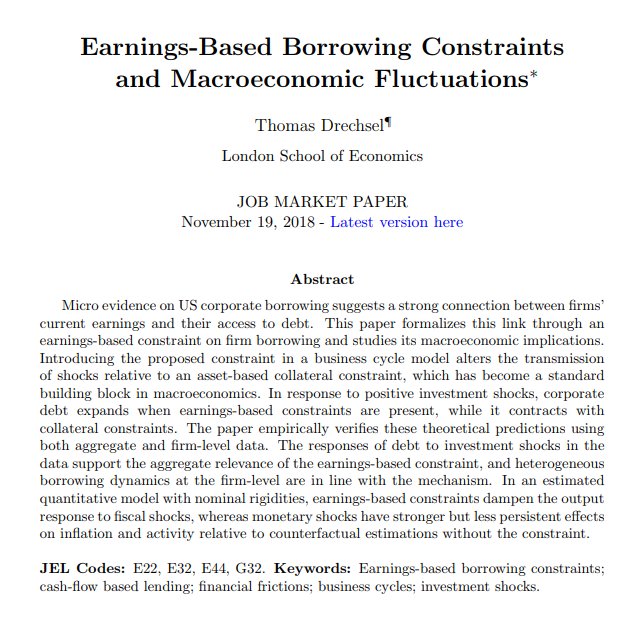
I mostly tweet about economic research and rant about the Financial-Entertainment Complex. Some tweets may be humourous. In London, from Madrid.
How to get URL link on X (Twitter) App


 The standard model used successfully for nowcasting in the last decades is a linear, Gaussian, Dynamic Factor model with constant parameters. During the great moderation, this was a fine approximation to the process of economic activity… (2/N)
The standard model used successfully for nowcasting in the last decades is a linear, Gaussian, Dynamic Factor model with constant parameters. During the great moderation, this was a fine approximation to the process of economic activity… (2/N)
https://twitter.com/JuanAntolinDiaz/status/1067370148754087937There is tons of decades-old research highlighting the importance of careful data treatment in time series (trend, seasonality, outliers), which is simply IGNORED, with embarrassing results!

 Looking at direct micro evidence on firm borrowing, Thomas points out that lenders typically restrict debt based on firm's earnings flows. Covenants, for example, are pervasive legal conditions written into loans that state that debt-to-EBIDTA cannot exceed certain limits.
Looking at direct micro evidence on firm borrowing, Thomas points out that lenders typically restrict debt based on firm's earnings flows. Covenants, for example, are pervasive legal conditions written into loans that state that debt-to-EBIDTA cannot exceed certain limits.


 It was coined in 2008 by Michael Biggs, then an economist at Deutsche Bank. He found that a suitably transformed measure of credit flows had a strong contemporaneous correlation with GDP growth. He also wrote an (unpublished) paper on the issue. 2/ dnb.nl/binaries/Worki…
It was coined in 2008 by Michael Biggs, then an economist at Deutsche Bank. He found that a suitably transformed measure of credit flows had a strong contemporaneous correlation with GDP growth. He also wrote an (unpublished) paper on the issue. 2/ dnb.nl/binaries/Worki…

 Nos sale que la economía de Alemania sería la peor parada, Francia y España algo menos y EEUU solo se vería ligeramente afectada.
Nos sale que la economía de Alemania sería la peor parada, Francia y España algo menos y EEUU solo se vería ligeramente afectada. 

 A recession in Italy would transmit to the Euro Area, mostly through Germany, who appears to be the most exposed to Italian growth. Spain and France appear to be less vulnerable.
A recession in Italy would transmit to the Euro Area, mostly through Germany, who appears to be the most exposed to Italian growth. Spain and France appear to be less vulnerable. 